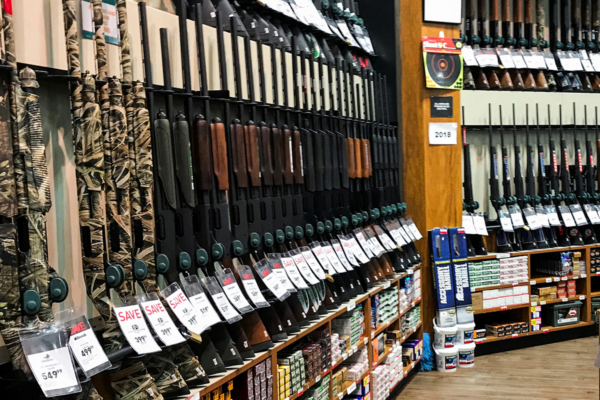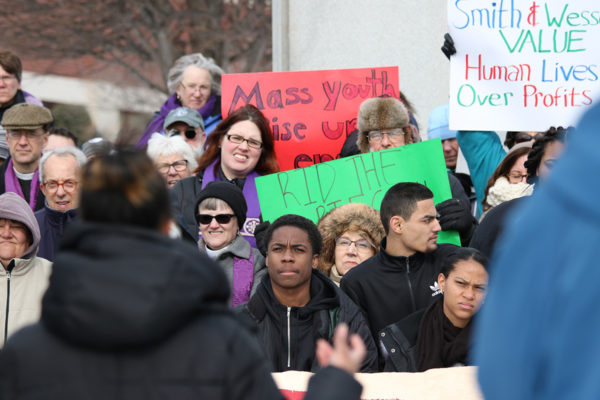Episcopal Church as shareholder takes initial steps toward direct advocacy with gun manufacturersPosted Jul 25, 2019 |
|

Guns for sale are seen inside of a Dick’s Sporting Goods store in Stroudsburg, Pennsylvania, in February 2018. Photo: Reuters
[Episcopal News Service] The Episcopal Church has begun investing in gun manufacturers as part of a policy approved in 2018 by General Convention that was intended to give the church a seat at the table in gun safety discussions with the companies.
The church’s Executive Council oversees such advocacy through its Committee on Corporate Social Responsibility, led by Western Massachusetts Bishop Douglas Fisher. As a shareholder, the church ultimately will have the ability to propose shareholder resolutions with the three publicly traded companies: Sturm Ruger (70 shares); American Outdoor Brands, which owns Smith & Wesson (300 shares); and Olin Corporation, owner of Winchester Ammunition (160 shares).
Shareholder resolutions sometimes gain momentum over time with company leaders, Fisher told Episcopal News Service, so “even if you don’t get up to 50% [of the vote], leadership takes notice.”
He and other church leaders are highlighting a document known as the Mosbacher-Bennett Principles for Investors in the Gun Industry, which was developed by the anti-gun violence group Do Not Stand Idly By. The document recommends pressuring gun manufacturers to ensure responsible gun sales, improve gun safety, support crime-reduction activities and minimize the secondary gun market.
Just $2,000 of stock is required to be eligible to submit shareholder resolutions. The church, which bought the shares in November and December – the shares in the three companies are now worth about $10,000 – must wait a year from purchase until it is eligible to submit a shareholder resolution, under federal regulations. Shareholder resolutions submitted by the church first would need to be reviewed by Executive Council. None has yet been drafted.
“There’s no intention of trying to disrupt business or bankrupt the gun manufacturers or do anything nefarious along those lines,” said Connecticut Bishop Ian Douglas, a convener of Bishops United Against Gun Violence. Rather, he compared the push for gun safety to the shareholder advocacy in the 1960s that pressured automakers to make seat belts standard in all vehicles.
“We believe that firearms manufacturers can do more technologically to produce safer guns,” Douglas said in an interview with ENS. Universal background checks for purchases, smaller magazines, and fingerprint verification are among the reforms advocated by Bishops United – “the kind of legislation that the vast majority of Americans support,” Douglas said.
Legislative victories, however, have been rare in recent years despite the growing alarm nationally over gun violence, particularly mass shootings at churches, schools and other public spaces. That is one reason The Episcopal Church is also stepping up its direct appeals to companies, said Fisher, who is one of the 80 or so Episcopal bishops in the Bishops United network.

Episcopalians join an interfaith group of demonstrators outside a Smith & Wesson facility in Springfield, Massachusetts, on March 14, 2018. Photo: Victoria Ix/Diocese of Western Massachusetts
Fisher said he has participated in rallies outside a Smith & Wesson plant in Springfield, Massachusetts, where young people tried to present a letter to the company but were turned away. His diocese purchased shares in American Outdoor Brands to give Episcopalians and those young allies greater leverage in getting their message heard.
“We’re trying to open the door that young people have been knocking on,” he said, alluding to youth-led March for Our Lives movement that formed in the wake of last year’s school massacre in Parkland, Florida.
Fisher can understand the concerns of Episcopalians who may bristle at the thought of the church owning stock in the companies that make the weapons used in mass shootings.
“On the other hand, how are we going to have an impact on the public health crisis of gun violence?” he said.
Douglas added that the church and other investors have a relatively low threshold of shares needed to put forward a shareholder resolution.
“The profit is minuscule compared to the voice that it purchases,” he said, and even a small profit, if desired, could be applied to anti-violence work instead of the church’s bottom line.
The Episcopal Church was a party to a significant victory in shareholder advocacy on gun safety in 2018 when Dick’s Sporting Goods announced it would stop selling assault-style rifles and wouldn’t sell other guns to anyone under 21. The company did not attribute the decision to the pressure applied by The Episcopal Church and its ecumenical partners, but Dick’s had been a recent target for such advocacy.
The church and its allies coordinate some of their shareholder advocacy through the Interfaith Center on Corporate Responsibility, of which The Episcopal Church is a member, and the center has warned that proposed changes in federal regulations could harm shareholder rights. One proposal is to require shareholders to own at least 1% of company stock to submit a resolution, putting that avenue out of reach for all but the largest investors. Another proposal would make it more difficult to reintroduce resolutions that receive some support but fail to pass.
“That would be a crushing blow to socially responsible investing,” Fisher said.
His committee also is considering ways of expanding its advocacy on gun safety issues beyond gun manufacturers to possibly include other companies whose business overlaps with the gun industry. Banks are one example, Fisher said, and he pointed to a report by the group Guns Down America that graded some of the country’s largest banks, including on their investments with gun manufacturers.
Another member of the Bishops United network, retired Newark Bishop Mark Beckwith, has followed up on that report by flagging its findings for several dioceses that have accounts with the banks. The information may provide an opening for diocesan leaders to discuss gun safety issues with bank officials, Beckwith said.
For now, Beckwith told ENS, this is a “low-key” tactic based in the hope that conversations may lead to change.
“This is not ‘Let’s all pull out of these banks, these offending banks,’” Beckwith said, “but rather let us engage in a conversation and work together on what we think are best practices.”
– David Paulsen is an editor and reporter for the Episcopal News Service. He can be reached at dpaulsen@episcopalchurch.org.

Social Menu